Online sportsbook operators in Maryland are now facing a steeper tax bill after Governor Wes Moore officially enacted a law increasing the tax rate for mobile sports betting platforms. The change, which raises the rate from 15% to 20%, was included in House Bill 352, also known as the Budget Reconciliation and Financing Act of 2025.
Signed into law on May 21, the measure positions Maryland alongside states like Illinois and Ohio, both of which have implemented similar tax rates on online betting revenues. Though the increase represents a noticeable jump from the previous rate, it reflects a compromise after a more ambitious proposal by the governor failed to gain sufficient traction among lawmakers.
Original Proposal Met with Legislative Resistance
Governor Moore had initially called for a much higher tax rate of 30% on mobile sportsbook revenues as part of his January budget proposal. His rationale emphasized fiscal necessity—namely a $2.7 billion budget shortfall—and an attempt to bring Maryland’s tax policy in line with neighboring states. However, this push met with considerable opposition.
Lawmakers ultimately reduced the increase to 20% during negotiations, with the House Ways and Means Committee approving the amended version of HB 352 by a 13-5 vote. Senate President Bill Ferguson and House Speaker Adrienne A. Jones, who helped shape the $67.3 billion fiscal framework, supported the final compromise. The new rate also omits an earlier proposal to hike casino table game taxes from 20% to 25%.
Revenue Reallocation and Projections
The updated law not only adjusts tax rates but also redirects how the collected funds will be distributed. Under the new structure, 5% of the tax revenue from mobile sports betting will now flow directly into Maryland’s general fund. The remaining 95% continues to support education initiatives via the Blueprint for Maryland’s Future Fund, which has already received over $160 million in sports betting-related taxes since the state’s market launched in December 2021.
In the first eight months of fiscal year 2025 alone, Maryland collected over $61 million from sportsbook operators, and the tax rate adjustment is projected to generate an additional $32 million for the state’s coffers by fiscal year 2026.
Industry Impact and National Context
DraftKings, one of 11 licensed mobile sportsbooks in Maryland, has already factored the 20% tax rate into its financial planning. The company recently forecasted a $30 million dip in 2025 revenue and a $26 million reduction in adjusted EBITDA due to regulatory and tax changes, including the Maryland hike.
“This wasn’t just about balancing a budget,” Moore noted in a press release cited by Covers. “It was about weathering two storms: A fiscal crisis and a new White House that attacks our economy.”
Maryland is the first state in 2025 to finalize an increase in sports betting taxes, although other states are exploring similar measures. In Louisiana, legislation has passed the House to raise the tax from 15% to 21.5%, while Ohio is considering a further increase after raising its rate to 20% last year. New Jersey has also proposed raising its online sports betting tax rate from 13% to 25%.
Meanwhile, Colorado plans to eliminate deductions for free bets from taxable revenue starting in July 2025, effectively raising the burden on operators there as well.
A New Era of Regulation
As more states reevaluate their tax policies on sports betting, Maryland’s recent legislation reflects a broader national trend toward higher levies on operators in a maturing industry. The balancing act between maximizing public revenue and maintaining a competitive market continues to define the legislative approach in jurisdictions across the country.
Although Maryland’s new tax rate is less severe than what some neighboring states are proposing, it still represents a significant step toward closing budget gaps and funding essential public services, especially in education. And with more states likely to follow, sportsbook operators nationwide may need to adjust their financial strategies accordingly.


